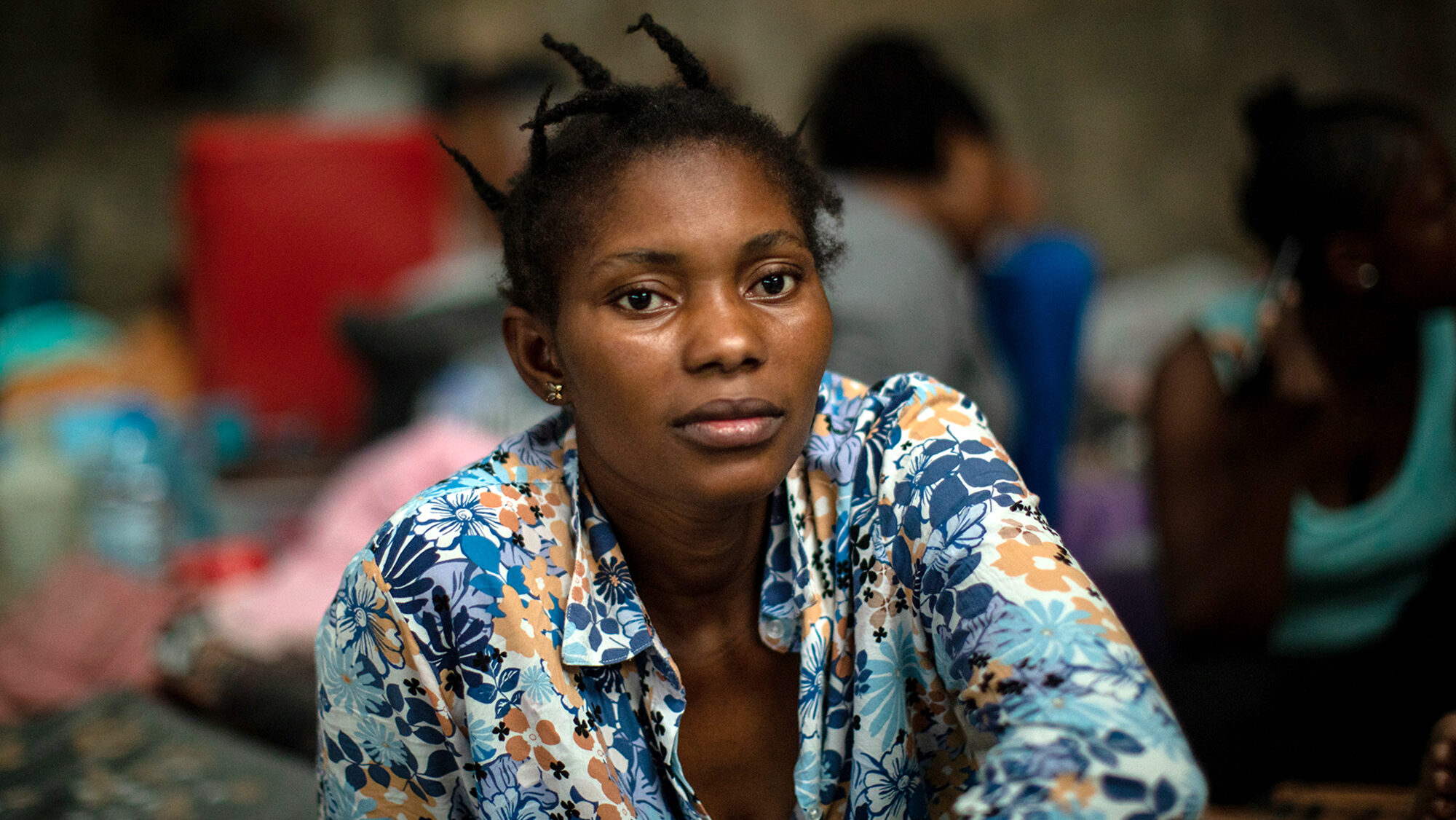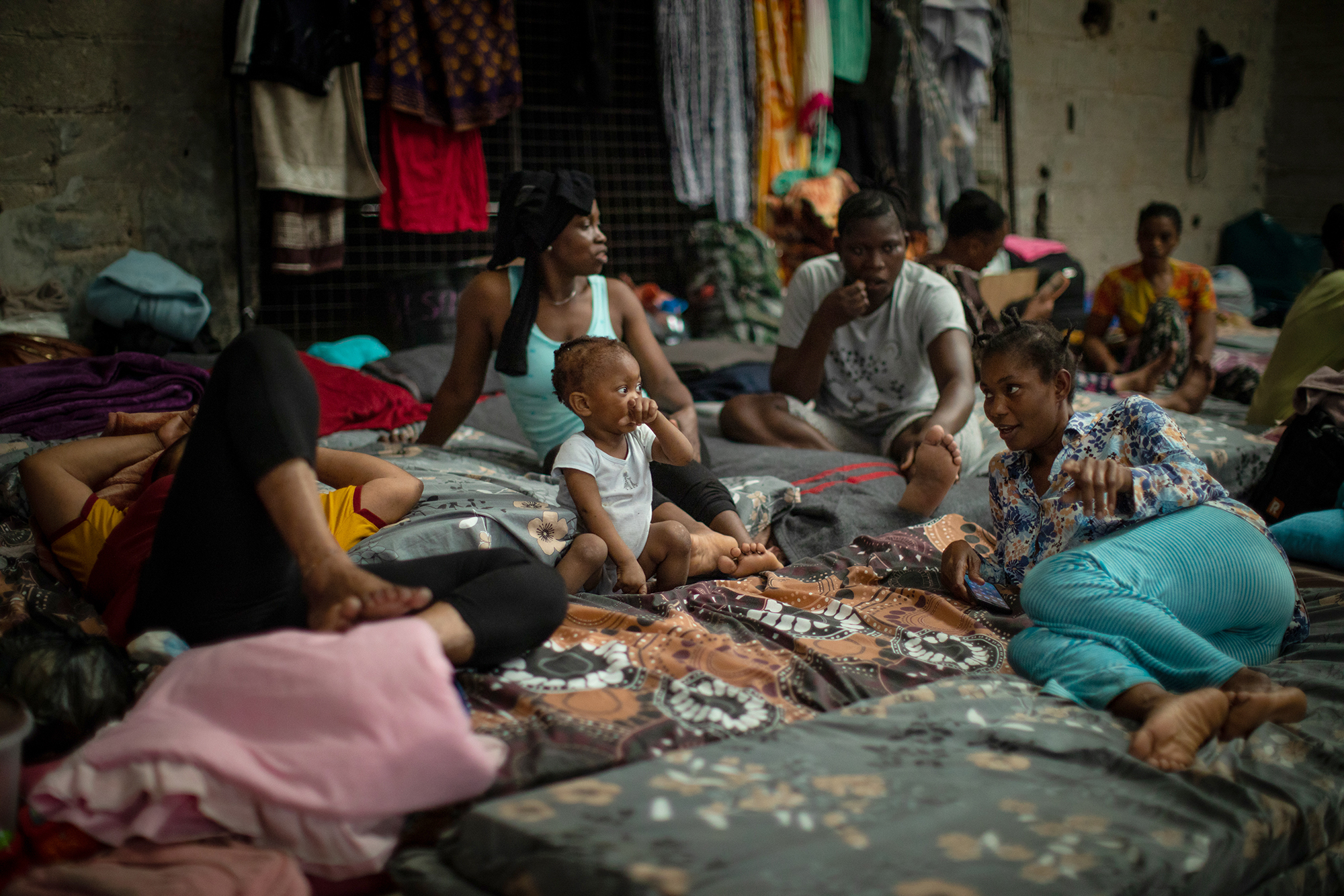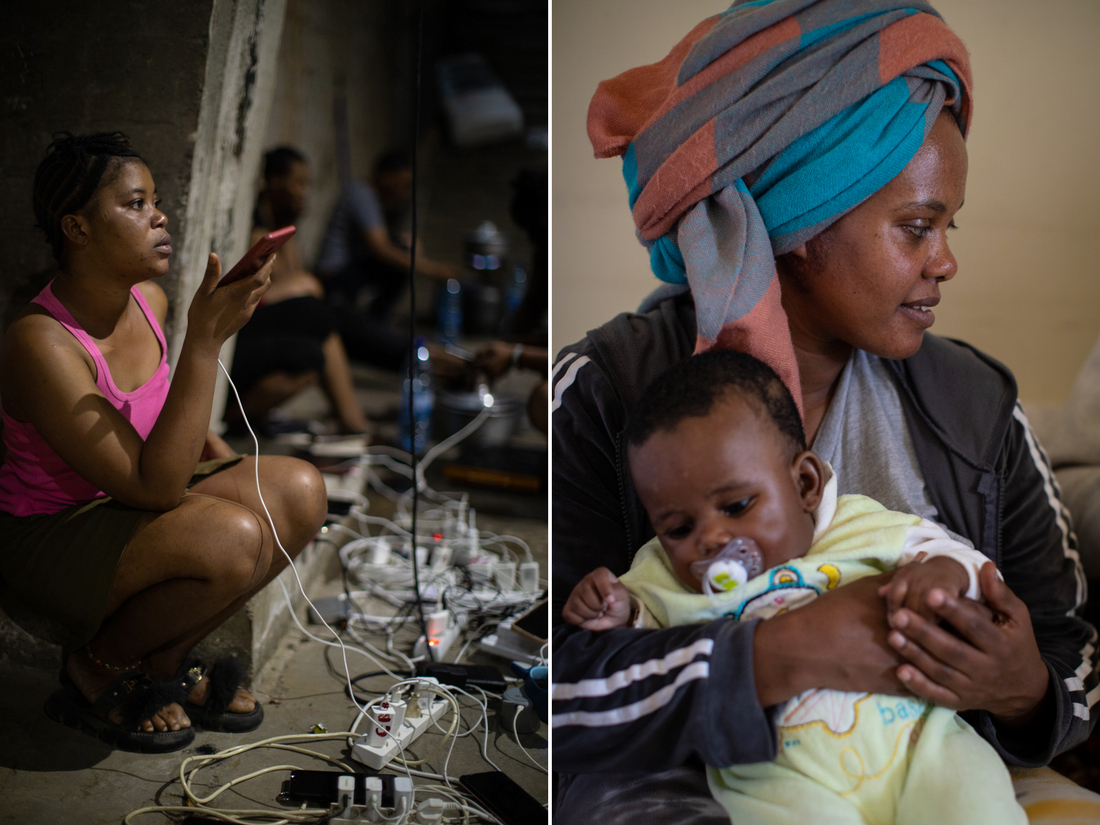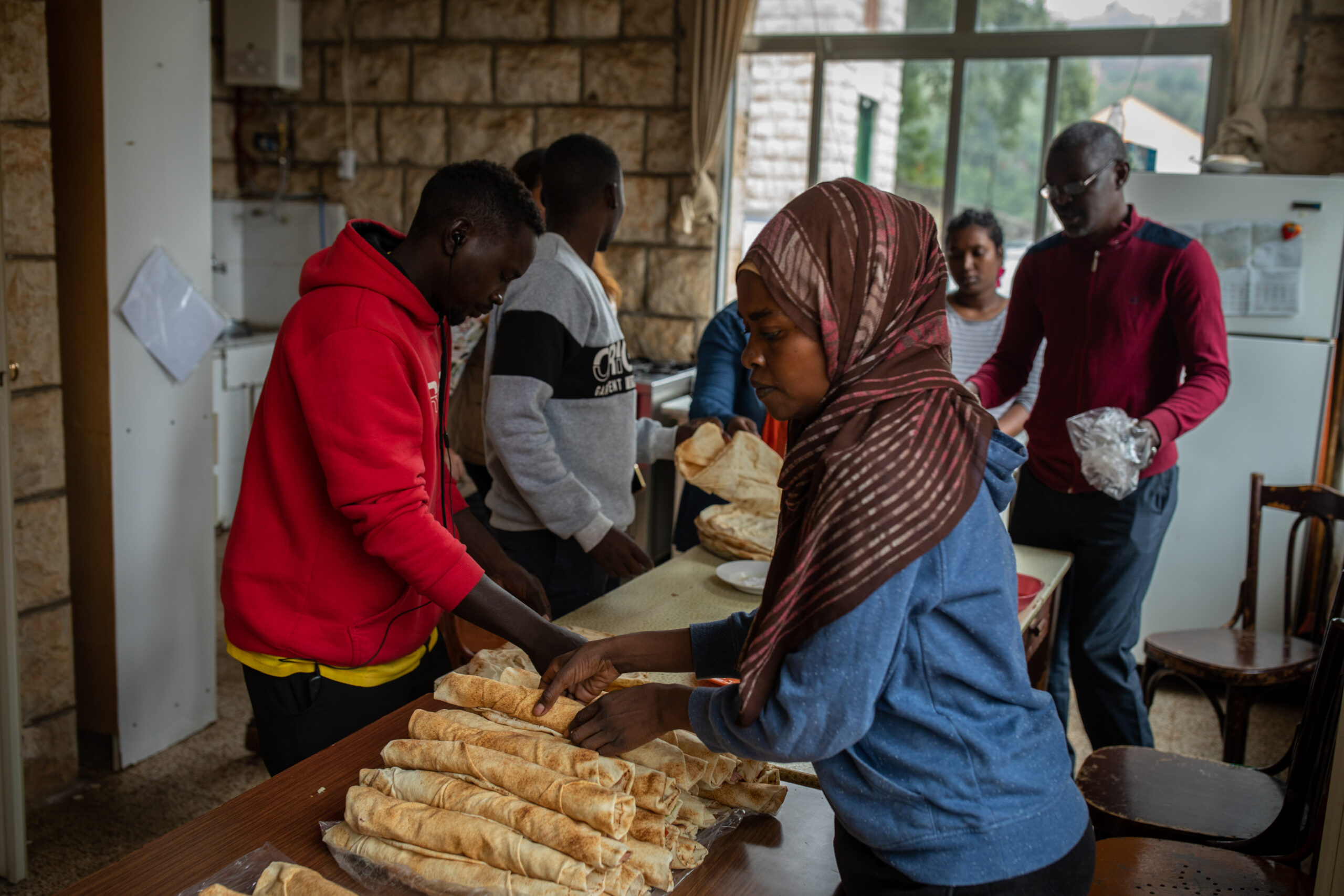
Editor’s note: This story is part of ‘The Great Illusion,’ a series by CNN’s As Equals all about work: investigating which industries are most harmful for women workers, revealing the true cost of care work, and exploring how it can all be fixed. For information about how CNN As Equals is funded and more, check out our FAQs.
Beirut, Lebanon — When the first wave of Israeli airstrikes hit Beirut, Mariatu Swaray frantically called her employers to ask for help. But they had already fled abroad, leaving their Sierra Leonean domestic worker and her three-month-old son to fend for themselves.
Hours later, an Israeli missile destroyed the building next door to their home in the Lebanese capital. Now, every time there is an explosion, baby Abdul Mohammad points to the sky.
“I heard the bombing, and I was so scared,” Swaray told CNN, sitting on a thin mattress in an informal shelter for internally displaced migrant workers in Beirut. “From that moment I had to just take my kid and run away.”
After two weeks sleeping on the streets, Swaray is now camped out here, along with 150 other women and six children from Sierra Leone. Mattresses line the walls of the dark, damp concrete warehouse. There is one charging point for over 100 phones. Bats flutter above the women as they lie there in the dusty half-light.
With no possessions and no money, many of the women cannot afford data SIM cards to call home.
“I haven’t spoken to my family for ten days,” Swaray said, as Abdul Mohammed played nearby. “They must be so worried about me.”
‘We are suffocating': CNN speaks to migrant workers abandoned in Lebanon
In late September, the Israeli military assassinated Hassan Nasrallah, the head of the Shia political and militant group Hezbollah, which is designated a terrorist organization by the United States. The UN refugee agency, UNHCR, estimates that since then over 1.2 million people have been displaced by strikes and fighting between the Israeli Army and Hezbollah – around a fifth of the Lebanese population.
A significant proportion of the estimated 177,000 migrant workers living in Lebanon are thought to be among them. Most are employed under the country’s ‘kafala,’ or sponsorship, system. This system — used in Lebanon, Jordan and many Gulf countries — fuses a worker to one employer and in the process, their rights and agency are removed. The employer takes the worker’s passport, they are exempt from the country’s labour protections and though they can be fired, they can never quit. In 2021, UN Women estimated that “76% of all migrant workers and 99% of migrant domestic workers” in Lebanon were women.
“What we understand of the kafala system is that it sounds like a modern-day slavery system,” said Nour Shawaf, regional humanitarian policy advisor for Oxfam, speaking above the constant buzz of an Israeli drone flying above her office.

Nour Shawaf, regional Humanitarian Policy Advisor at Oxfam, stands outside her office in the centre of Beirut as drones buzz overhead and the sonic booms made by Israeli jets can be heard on Monday, October 7, 2024. Oliver Marsden
“The employers who have taken the passports of the migrants have left them with no paperwork today, so they are stuck in the country. Even if they decide to leave, they do not have legal documentation to leave.”
As the Israeli military’s bombing campaign has intensified across Lebanon, many migrant domestic workers have been abandoned by their employers who have fled their homes to save themselves.
Another migrant domestic worker from Sierra Leone, who was too scared to give her name for fear of reprisals, recalled how her employers left the house as the bombing started and told her to “stay and look after it.”
“They said they were going to the supermarket for supplies and would be right back,” she said while picking bits of foam from her mattress on the dirt-stained floor. The family never returned.
Like many others, the young woman in her twenties, was forced to seek shelter on the streets of Beirut – sleeping rough on the pavements, the parks and the public beach – before finally moving into the refuge.

Migrant workers from Sierra Leone take refuge in a makeshift shelter in Beirut on Sunday, October 7, following Israeli strikes on the southern suburbs of the capital in Lebanon. Oliver Marsden
Volunteers working with migrants told CNN the lack of safe places to shelter makes women especially vulnerable to trafficking. As if to make the point, while CNN was visiting the shelter, a black BMW with tinted windows slowed to an idle as it passed the entrance. Two men eyed the women taking in the air outside, before speeding off once they were spotted by volunteers.
It’s not just individual employers who seem to have deprioritized the migrant workforce they are responsible for.
Two months ago, Nasser Yassin, Lebanon’s Environment Minister and head of its national emergency committee, said in an interview with local media that by setting up 900 temporary shelters the authorities were making “preparations for the displacement of over a million Lebanese.” But half a dozen migrant workers interviewed by CNN said they had either been ejected from or turned away by these official shelters.
CNN reached out to Yassin to ask about the migrants’ claims but received no reply ahead of publication. A press statement released by the officer of Hector Hajjar, Lebanon’s Minister of Social Affairs, rejected any accusations of discrimination between displaced people and spoke of the ministry’s “commitment…to protect all displaced persons on Lebanese territory.”
Into the gap has stepped local non-profits and ordinary Lebanese citizens.

Lea Ghorayeb addresses migrant workers from Sierra Leone in the makeshift shelter she and six other friends helped establish in Beirut following Israeli strikes on the southern suburbs of the capital in Lebanon. Oliver Marsden
Lea Ghorayeb and six other friends saw the West African women sleeping in the open on the public beach on September 28 and decided to help. At first, they tried to find them space in an official shelter but after two days they said the women were kicked out. Following this, the seven friends rented the warehouse space for two months and began fundraising for supplies. A makeshift kitchen has been erected in one corner and clothes drying lines strung up in another.
“The operation is becoming a bit more difficult every day, but we are trying to find solutions,” Ghorayeb explained. “The women want to go home to Sierra Leone. We are trying to reach their embassy, but it hasn’t worked yet. Since the flights are becoming a bit tricky, we might have to get them a boat somewhere and then fly them home.”
In visits to two shelters in Beirut, almost all the Sierra Leonean women CNN spoke to said that they felt abandoned by their consulate.
Samir Bahoun, the consulate office manager tasked with issuing emergency travel documentation, told CNN that the consulate only deals with the employers or associations trying to help the women.
“The employers of domestic workers or the associations trying to help them should pay for their tickets,” he said over the phone. “Usually, our consulate only deals with the employers themselves. The employer should come to consulate with the citizen.”
This policy leaves women who have been abandoned by their employers with no recourse.

A migrant worker from Sierra Leone takes the opportunity to charge her phone in a makeshift shelter in Beirut on Sunday, October 6. (Right) Asha Mohammad Basin, 29, from Ethiopia, clutches her four-month-old baby Amir in a makeshift shelter established in a convent near to Ghosta on Monday, October 7. Oliver Marsden
In a small park in downtown Beirut, now home to displaced families from Ethiopia, Bangladesh and Syria, tents and blankets have been hung from trees and bushes in an attempt to block out the elements. Children ran over to volunteers as they arrived with boxes full of juice cartons, harried fathers talking on their mobile phones before the batteries died.
Dara Foi’elle of Migrant Workers Action, a grassroots organisation that provides support for the migrants and advocates for fair immigration and labour laws, told CNN that domestic workers in Lebanon faced a “dire” situation.
“Many of the migrant workers lived in the areas that are now being hit,” she said. “We are now focussing our attention on migrants that have been rejected from government shelters.”
Even if the migrant worker’s home countries were able to charter flights like many of their rich and middle-income counterparts have done, Foi’elle told CNN that for many migrant workers, especially domestic workers and those whose residence papers have now expired, it might not be so easy. To leave Lebanon after your visa has expired, Foi’elle explained, you need to pay an overstay fee. This, she said, can be as much as “several hundred dollars.”
Nestled in the mountains one thousand metres above Beirut sits the quiet village of Ghosta. Perched at the end of a single lane road, looking out towards the sea, the Nuns of the Charity Convent has been transformed into a makeshift shelter.
The shelter in the clouds seems a world away from the capital, even though black smoke from the daily airstrikes can be seen rising above the southern part of the city.

Migrant workers make sandwiches in the communal kitchen of a makeshift shelter established in a convent near to Ghosta on Monday, October 7 Oliver Marsden
Men, women and children from Ethiopia, Sudan and Sri Lanka, who fled the fighting in Southern Lebanon, all live together and many of them cannot go back to homelands also decimated by recent or on-going conflict.
The shelter is managed by Migrant Services and Development, a local non-governmental organization, and it currently houses 74 displaced migrant workers and their families.
In the corner of a first-floor room, Asha Mohammad Yasin, 29, from Ethiopia holds her 4-month-old son Amir. Sitting beside her, her husband Khalid Abdullah Daoud feeds their twin daughter Amira formula from a bottle.
Two weeks ago, the couple were forced to flee their home in the village of Kafra in south Lebanon, 5km from the border with Israel, as the Israeli bombing campaign surged in ferocity. They escaped by car to the southern city of Sidon where they slept in the doorway of an abandoned home. Despite the horrors of what they have seen, they know they are lucky to have found their way to the convent. But, like the plumes of black smoke in the distance, the uncertainty about theirs and their children’s future continues to loom large.
“We saw a lot of bombing, destroyed buildings. We saw people burning inside their cars,” Mohammad Yasin recounted, arms wrapped around her baby. “We are safe now, but we are not happy. We don’t know where we will go.”
Lead image: Mariatu Swaray, 27, takes refuge in a makeshift shelter in Beirut on Sunday, October 6, after Israeli strikes on the southern suburbs of the capital forced her from her home. Credit: Oliver Marsden



